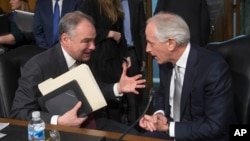The airstrikes ordered by President Donald Trump against Syria last week have prompted the U.S. Congress to revisit an often-delayed debate that centers on the most serious of its powers: the decision to authorize U.S. military force abroad.
A bipartisan group, led by Senate Foreign Relations Committee Chairman Bob Corker, a Republican from Tennessee, and Senator Tim Kaine, a Democrat from Virginia, is now proposing new legislation that would reopen that discussion.
"For as long as I have helped lead the Senate Foreign Relations Committee, beginning as ranking member in 2013, we have been engaged in a discussion over the 2001 Authorization for Use of Military Force," Corker said in a statement late Monday, adding that he hoped the new legislation "will ultimately strike an appropriate balance of ensuring the administration has the flexibility necessary to win this fight, while strengthening the rightful and necessary role of Congress."
U.S. presidents are required by law to notify Congress of military action and must secure authorization to commit troops beyond 60 days.
Sixteen years have passed and at least 37 different military operations have occurred since lawmakers last debated the United States' legal authority to conduct military action overseas. Passed in the months after the September 11 attacks, the Authorization for Use of Military Force (AUMF) originally justified the invasions of Afghanistan and Iraq, but has since grown to include action in 14 countries and to combat threats such as the Islamic State group that didn't exist at the time.
"Our proposal finally repeals those authorizations and makes Congress do its job by weighing in on where, when and with whom we are at war," Kaine said Monday.
Some reluctance
But some lawmakers are hesitant to replace the current AUMF, citing the 60-word document as sufficient justification.
"The current AMUF does have the existing authority, and the question going forward on any new AUMF is does it give our military the tools they need, or does it tie their hands behind their back?" House Speaker Paul Ryan told reporters Tuesday morning, when asked whether he would bring a House version of the Corker-Kaine bill up for a vote.
The Senate proposal also drew criticism from Representative Barbara Lee, a Democrat from California, who tried to open a debate on the AUMF in the House last year.
"Rather than reining in the Trump administration's blank check for war, the Corker-Kaine AUMF would continue all current military operations, allow any president to unilaterally expand our wars and effectively consent to endless war," Lee said Tuesday.
Some Democratic members of Congress expressed concern about the strikes in the context of the need for a broader U.S. strategy in Syria, while Kaine said, "President Trump's decision to launch airstrikes against the Syrian government without Congress' approval is illegal."
But as John Bellinger, a legal adviser for the State Department and National Security Council during the George W. Bush administration, told VOA, "The AUMF enacted after 9/11 is not so much focused on Syria and humanitarian intervention but in the authorization to use force against terrorist groups — al-Qaida, the Taliban and now, ISIS."
Bellinger — now a senior fellow in international law at the Council on Foreign Relations, a foreign policy research group in New York — said, "Of course, that would not have provided the authority for use of force in Syria or any other country for a humanitarian purpose."
Hearing next week
The latest debate over the AUMF reflects a desire on Capitol Hill to weigh in on the United States' continuing military involvement overseas.The Corker-Kaine proposal will be considered in the Foreign Relations Committee on April 23.
But passage could still be difficult, unless U.S. involvement in Syria deepens and continues for several weeks or months, Lawrence Korb, a senior fellow in defense studies at the Center for American Progress, a progressive public policy research group in Washington, told VOA.
"People have been talking about this for several years, but nothing has really happened, because even when President [Barack] Obama got involved in Syria to combat ISIS, he said that was still part of the 2001 AUMF," Korb said.
Senator Susan Collins, a Maine Republican, told VOA that while the Syria strikes had forced Congress to confront the issue again, the scale and scope of the decision was considerable.
"To be frank," she said, "I think many people were happy to duck the issue for a long time because these are very hard decisions to make — whether to authorize the use of military force. There's no harder decision that a member of Congress can make — to commit troops to a foreign conflict."
VOA Senate correspondent Michael Bowman contributed to this report.






